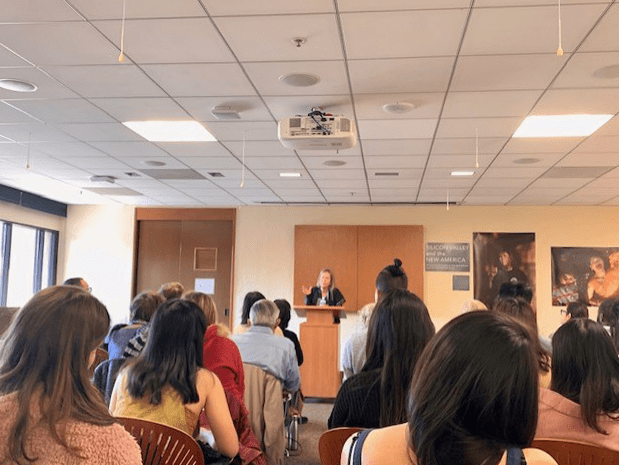How do writers balance writing with life commitments? How can teaching poetry enhance one’s own work? These are some of the questions that Louise Gluck, Pulitzer Prize winner and former U.S. poet laureate, addressed in her poetry colloquium on Wednesday.
Gluck is currently the Mohr visiting professor in the creative writing program. She spoke to the challenge of writing in a society that places emphasis on productivity, citing the need to write in “time that is stolen” from other duties and pursuits.
“How do you continue to write from unexpected places?” Gluck asked. “If you’re not yourself surprised there will be no excitement on the page.”
Gluck emphasized maintaining a writing routine despite other obligations.
“When I have steady, empty time, I produce steady emptiness,” she said.
Gluck also reflected on her career as a teacher, which she characterized as “open-minded scrutiny.” She said she was initially discouraged from pursuing teaching, having been told that teaching could “ruin” an artist. Gluck said this has not been her experience, as she has benefitted from her students’ ideas and energy.
“There’s an obligation to make something of what you’re looking at,” Gluck said. “I have a tendency to correct [my students’] views that are not my own — this is not good teaching, this is tyranny.”
Gluck also discussed the benefit of teaching forms that she does not usually practice herself in order to learn without the fear of making mistakes or not being an expert.
“Writers must find a way back to ignorance so discovery can be made on the page,” she said.
Gluck finished the colloquium with an informal Q&A session, answering questions on the relationship between narrative form and the female body, as well as the impact of being a woman in the teaching profession.
When asked for essential works which she would recommend to prospective writers, Gluck rejected the notion of a definitive canon.
“Recommendations depend on the writer, everybody has a different list,” she said.
When asked where she continues to find inspiration to write poetry, Gluck pointed to mundane, everyday experiences.
“Great poems don’t always come out of great, life-changing events,” she said.
Contact Brooke Beyer at bbeyer ‘at’ stanford.edu.
